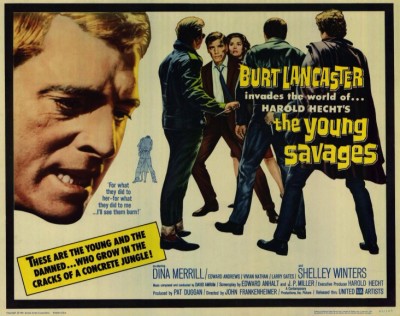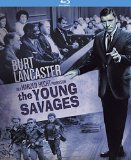| Reviews & Columns |
|
Reviews DVD TV on DVD Blu-ray 4K UHD International DVDs In Theaters Reviews by Studio Video Games Features Collector Series DVDs Easter Egg Database Interviews DVD Talk Radio Feature Articles Columns Anime Talk DVD Savant Horror DVDs The M.O.D. Squad Art House HD Talk Silent DVD
|
DVD Talk Forum |
|
|
| Resources |
|
DVD Price Search Customer Service #'s RCE Info Links |
|
Columns
|
|
|
Young Savages, The
THE MOVIE:
Please Note: The stills used here are taken from promotional materials and other sources, not the Blu-ray edition under review.

The Young Savages was the second directorial feature from John Frankenheimer, a pioneer of live television, and his first of four collaborations with Burt Lancaster. That it's the weakest of their team-ups should not be altogether surprising then, as Frankenheimer goes through some growing pains trying to apply his learned techniques and the social drama of his TV work to a larger canvas.
Lancaster stars in The Young Savages as Hank Bell, formerly Bellini, an Italian kid from a tough New York neighborhood who is now a respected district attorney. Hank is assigned a case involving three kids from his old block, including the son of one of his old girlfriends (Shelley Winters). The boys are the members of a street gang, and they are charged with a vicious stabbing of a blind Puerto Rican teenager. They claim self-defense, a story that doesn't add up. As racial tensions rise, Hank and his boss (Edward Andrews) push for the death penalty.
As Hank begins to build his case, he is pulled from many sides. His ex asks him to keep an open mind about her child, while the dead boy's mother cries for justice. Hank's partner (Telly Savalas) maintains a cynical cop's-eye view of the matter, while Hank's wife (Dina Merrill) angrily chides him for being so politically vicious. Not to mention the Italian and Puerto Rican gangleaders who send their minions to apply their own kind of pressure. This all weighs on the prosecutor as he tries to sift through the evidence and testimony. Not everything is as cut and dried as it seems.
The interviews Hank conducts with the various witnesses comprise some of the best stuff in The Young Savages, especially as Frankenheimer takes his actor to different sections of New York, shooting life on the streets in at least some attempt to counterbalance the near-cartoonish portrayal of urban juvenile delinquency. The script tackles racism with an admirable frankness, never shying away from either the unctuous bigotry of the killers or the more seemly criminal behavior of some of their Puerto Rican rivals. One gets the sense that finding the balance Hank seeks is also important to Frankenheimer. Throughout the eventual trial, when Hank is questioned about his seemingly bizarre prosecutorial tactics (he appears to be tanking the case), he insists he is just trying to find the truth.
The problem is, The Young Savages lacks the same rigor its fictional D.A. shows in his pursuit of a righteous outcome. One can feel the filmmakers straining to find ways to justify their own bias by adding challenging elements to bolster the counter-argument. This devil's advocacy comes off as overly convenient and slightly disingenuous. An attack on Hank's wife, for instance, compels her to question the empathy she has shown the accused, while Hank's own confrontation with street toughs gives him concerns about his personal bloodlust. These sequences make sense in the grand scheme of the dramaturgy, but they are poorly integrated in the whole and seem only minor distractions from a film that is not at all shy about its driving point. (Which, is not wrong in and of itself; have a point of view! It's fine!)
And it's not Hank that tanks the trial, it's Frankenheimer and his writers. Things never get messy, nor are there any unpredictable revelations. The bits we see only hit the right points and are come by too easily, hurrying too fast through the complexities that have been cultivated, rushing to bring us to Hank's inevitable redemption. At least in the eyes of the concerned white women in his life. His bosses, the press, and the victim's family? Not so much.
Still, there's a lot to like. Frankenheimer pulls of some artfully amazing shots, and his general storytelling skills are so facile, the movie never really lags. The way in which the action moves between different settings is so well choreographed, the narrative picks up a real momentum, almost like you're being led through a maze. Lancaster is really strong, as well, providing a stoic wall for other characters to bounce off. I also really liked Merrill, who allegedly never got on with Ray; her scene where she drinks too much and makes fun of Lancaster's character is edgy and funny. The actress has a good drunk shtick.
The Young Savages is also very earnest, and that both works for it and against it. As silly as its knee-jerk liberalism feels at times, the sheer force of belief combined with the talent behind it wins out. The Young Savages still has a relevancy in its dissection of race and systematic justice (or lack thereof), even if it doesn't still crackle with the same energy as 12 Angry Men or other contemporaries.
THE BLU-RAY
Video:
The anamorphic 1.75:1 transfer shows the black-and-white movie in high def via a well-preserved print. There are still occasional instances of surface noise, but the overall resolution is fairly sharp and detail and tonal balance remain solid throughout.
Sound:
A basic mono soundtrack presents the audio clearly with no real evidence of glitches but no stand-out moments either. The dialogue and music are separated nicely, and everything is easy to hear.
Extras:
None.
FINAL THOUGHTS:
Recommended. The Young Savages is a bit of a curious relic, a well-meaning crime drama with political overtones that has certainly aged since its 1961 release even if some of the topics it touches on (racism, justice) remain altogether too relevant. Burt Lancaster turns in a fine performance as a New York prosecutor charged with overseeing a case of three white juvenile delinquents charged with the murder of a blind Puerto Rican boy. Director John Frankenheimer, fresh off a storied television career and only working here on his second cinematic feature, shows a great agility with visual language even if the drama is a bit clunky. An interesting film, if not a great one.
Jamie S. Rich is a novelist and comic book writer. He is best known for his collaborations with Joelle Jones, including the hardboiled crime comic book You Have Killed Me, the challenging romance 12 Reasons Why I Love Her, and the 2007 prose novel Have You Seen the Horizon Lately?, for which Jones did the cover. All three were published by Oni Press. His most recent projects include the futuristic romance A Boy and a Girl with Natalie Nourigat; Archer Coe and the Thousand Natural Shocks, a loopy crime tale drawn by Dan Christensen; and the horror miniseries Madame Frankenstein, a collaboration with Megan Levens. Follow Rich's blog at Confessions123.com.
|
| Popular Reviews |
| Sponsored Links |
|
|
| Sponsored Links |
|
|
| Release List | Reviews | Shop | Newsletter | Forum | DVD Giveaways | Blu-Ray | Advertise |
|
Copyright 2024 DVDTalk.com All Rights Reserved. Legal Info, Privacy Policy, Terms of Use,
Manage Preferences,
Your Privacy Choices | |||||||














